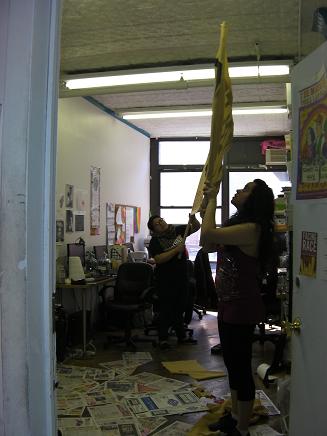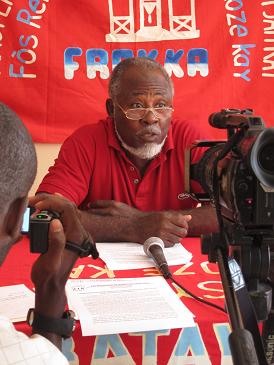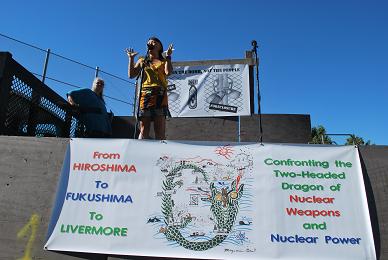
|
| ||||||||||||||||||||||
|
In June 2012 the Muste Institute made Social Justice Fund grants to two grassroots groups working in different states to halt “ICE Holds,” in which local law enforcement officials detain people they suspect may be immigrants, then hand them over to the federal government for deportation. In December, we interviewed Victoria Ruiz (VR) of the Olneyville Neighborhood Association in Rhode Island and Esther R. (ER) of the Austin Immigrant Rights Coalition in Texas about their work on this issue.
How long has your organization been around, and how did it start?
VR: Olneyville Neighborhood Association (ONA) has been around for about six years. There was a lot of gentrification going on in an area of Providence that’s home to a lot of immigrants. People got together to fight for the neighborhood, and ended up forming a grassroots organization where the members decide what issues to work on. That membership base began to confront the rising criminalization of immigrants and people of color in our communities.
ER: Austin Immigrant Rights Coalition (AIRC) was also founded six years ago, when organizations in Austin came together to push back against national anti-immigrant bill HR4437. As more immigrant community members got involved, AIRC became a membership organization and adopted a human rights framework.
Can you describe your organizing and leadership development models?
ER: AIRC trains immigrant community members to become human rights promoters. They learn about the Constitution, the Bill of Rights, the Universal Declaration of Human Rights, and the history of immigration and immigrants in this country. The promoters then form human rights committees of about 10 people, and they train the committee members. That’s the organizing mechanism.
Members involved in committees have a voice in the organization and cast their votes for priorities. Some members become regional team coordinators and support the formation of new committees.
|
VR: The model we use at ONA is similar to the Zapatista model of organizing, which seeks to collectively identify people who are interested in becoming leaders. Our model is like a wheel: the organization is in the center, and the spokes of individuals are in the community, bringing the folks around them into wider grassroots struggles for dignity, respect and justice.
We train our members and provide leadership opportunities. The members create their own groups to work on issues, and gain new skills to use in going out into the communities.
For example, our Barrio Digital (Digital Neighborhood) program came when members who were working on a campaign for access to driver licenses decided they also wanted computer classes in Spanish. So they created Barrio Digital, and brought in more people through outreach in the community.
Each member-leader becomes part of the rotating coordination team for six months to a year. They receive training and support on how to manage the daily work of the organization, and how to widen opportunities for the members. As a coordinator, after your term is up, you rotate back into the membership base, and a new member-leader rotates into the coordination team.
What led to your campaign against local law enforcement collaboration with ICE, the federal immigration enforcement agency?
VR: The passage of SB1070 in Arizona, and heavy lobbying by the prison-industrial complex to pass that racist anti-immigrant law, sparked nationwide grassroots resistance. We heard there was going to be an Arizona “copycat” law in Rhode Island, so we started a “We are all Arizona” coalition, and our members went out and got other organizations, churches, and labor groups to join. ONA leads the coalition.
We have a “big picture” analysis of why we confront collaboration between local law enforcement and ICE. We did lots of political education and identified how we were going to choose targets and tactics.
Simultaneously, we were seeing our members and their family members arrested for driving without a license, or harassed by police because of the color of their skin, or because they “look” undocumented. People were being deported. So that individual pain and loss lit the fire for the campaign.
ER: The federal government’s “Secure Communities” program (S-Comm) was piloted in Texas in 2008, and Travis County, where we’re located, introduced it in the county jails. Soon we had one of the highest rates of deportation of community members who had not even committed a crime, or only a minor infraction. So we saw increasing deportations and diminishing trust in local law enforcement. Members brought it up as an issue. We work to improve the community’s relationship with local law enforcement, by putting stories out there of how people are impacted by the program.
Mass incarceration and the criminalization of immigrants are a major human rights crisis in this country. This campaign is really important for human dignity, and keeping our families together, and because of how criminalization impacts our futures.
What have you accomplished so far?
|
ER: At the state level, working with community organizations statewide last year we were able to defeat a proposed bill to make S-Comm mandatory under Texas law. Participation is mandatory across the country right now but local officials have discretion. We were also able to defeat Arizona copycat laws that gave local enforcement officers authority to investigate a person’s immigration status.
On the local level, we're dealing with the city and the county, because when Austin police detain people they are booked into the county jail. We were able to get a joint resolution through two city commissions condemning the way S-Comm is implemented. The next step is to take that to the city council so it will affect the funds that the city provides to the county to detain people. And we are working with the County Commissioners Court to investigate how to restrict funds used by the Sheriff for ICE holds. We also have raised attention and media awareness around this issue.
VR: One big thing at ONA is how we've been able to bring in so many member-leaders and create a grassroots-led campaign. We've been able to create a space for political education, using it as a process to get to a mobilizing point, which is really exciting. We won public support through press conferences, and letters from law enforcement officials and local politicians criticizing S-Comm and ICE holds.
Rhode Island became the first state to revoke an agreement with ICE which had allowed state police to enforce immigration law. We also won the rescinding of an executive order which would have forced the state’s employers to verify the immigration status of their workers.
Led by ONA, our coalition presented on cooperation between local law enforcement and immigration to every police chief in Rhode Island. We created a relationship so now when we know of someone in an immigration hold, we have direct communication with the head of Corrections, and people who are ready to run delegations. We could not have done this without our community defense network, where people call to let us know that a family member has been detained.
What challenges and changing circumstances have you faced?
ER: At AIRC we started working on this before S-Comm became mandatory. Now that participation in the program is mandatory, the sheriff claims he is obligated to fully implement the program, despite plenty of legal evidence, and work that is happening across the country, showing that law enforcement executives are not obligated to honor all ICE holds. We provide as much advice and evidence as we can, but we know that real change will come through pressure.
|
VR: One of our challenges in ONA has always been how to keep the organizing democratic. Some people can make every meeting, and some only once a month, because of time conflicts with families or jobs. So we have had to think about meeting times in a different way, and how privilege affects participation, to make sure we're keeping it real so that those who are most directly affected can meet.
Another challenge is information: if I have the opportunity to be on the National Day Laborer Organizing Network calls three times a week, that's awesome, because I get a lot of information, but how do I share that with members? If they work in a jewelry factory seven days a week, they'll probably never get on a conference call, so how are we making sure that what one member-organizer knows, we all know? We're conscious of this but it's always a struggle.
With S-Comm being enforced in every state, the only person able to stop that is President Obama, so that was a huge change in our organizing. We had been working so hard to repeal S-Comm in Rhode Island. It was a year of work--it went somewhere, but the policy and direct action work took a halt once state discretion on S-Comm halted, so it was a challenge keeping hope going in the coalition. We had to work on the sustainability of members, political education, and thinking of individual fights as part of a larger picture that is the fight for freedom for all people.
|
Maintaining organizing structure is a huge challenge. Every couple of months a coordinator is rotating out of leadership and back to membership, so we have to train a new member-organizer who is going to fill that coordinator role, and make sure that members are receiving comprehensive training, and that knowledge and experience are sustained in the organization. It's cool to see that kind of democratic coordination but it's a challenge in terms of time and capacity.
What goals do you have for the next year?
VR: To stop the submission to ICE holds in Rhode Island, and fight for access to driver’s licenses in our state.
ER: Because Texas is such a large state, we’re focusing on a county ordinance that limits the sheriff’s authority to honor ICE holds.
Austin Immigrant Rights Coalition (AIRC): austinirc.org
Olneyville Neighborhood Association (ONA): onaprovidence.org
Read more: In this bonus interview, Esther and Victoria talk about the role of the Muste Institute's Social Justice Fund.
Justice for Bedouin Refugees
|
The Jahalin Association (Al Khan al Ahmar) is an organization of Bedouin refugees resisting forced displacement by the Israeli military, using grassroots activism with Palestinian, Israeli and international partners, legal petitions, and advocacy in a campaign for justice led by the community. The Jahalin Tribe was forced off their land in the Negev desert in 1951, following creation of the Israeli state. Their homes have been demolished numerous times, and they live under complete Israeli military control in the West Bank. The Association became a sponsored project of the Muste Institute in 2012. www.jahalin.org
|
Sheltering the Movement In January 2011 the Muste Institute began a new grant fund to support the educational and organizing work of our grassroots movement tenants. Grants covering the 30-month period from January 2011 through June 2013 total $77,100: Deep Dish TV: $11,025 for interactive video programs including “Uprooted: A Grassroots Examination of the Politics of Migration.” www.deepdishtv.org Granny Peace Brigade: $1,012.50 to educate the public about redirecting taxpayer money away from the military and toward social needs. www.grannypeacebrigade.org Met Council on Housing: $9,450 to educate and inform New York City tenants about their rights, and to organize and mobilize members around affordable housing and related issues. www.metcouncil.net/ National Committee to Reopen the Rosenberg Case: $337.50 to educate the public about the injustice involved in the execution of Ethel and Julius Rosenberg, and the ongoing need to protect civil liberties and constitutional rights. www.ncrrc.org New York State Youth Leadership Council: $3,375 for the “Education Not Deportation” campaign and other efforts by this undocumented-youth-led organization to challenge the broken immigration system through leadership development, organizing, education and a safe space for self-expression. www.nysylc.org Paper Tiger TV: $13,500 to expose and challenge corporate control of the media and promote alternatives; recent projects include a public spaces show, a “Little Mermaid Singalong,” a credit card debt opera, and an online video blog. www.papertiger.org Socialist Party USA: $5,400 for educational work, organizing and mobilizing against militarism and racism and in favor of labor rights, immigrant rights and access to health care. sp-usa.org War Resisters League: $33,000 for distributing WIN Magazine and other educational materials on nonviolence and against war, and for speaking events including those organized with Afghan activist and writer Malalai Joya and playwright Eve Ensler. www.warresisters.org
Social Justice Fund Grants, The Muste Institute’s Social Justice Fund makes grants for grassroots activist projects in the U.S. and around the world. If supporting nonviolent action for social justice is important to you, please donate now to help us expand this important program. Thank you! American Civil Liberties Union of Idaho Foundation, Boise, Idaho: $2,000 for Bridging Common Voices Against the Death Penalty in Idaho, a campaign to educate, organize and mobilize Idaho residents to challenge the use of the death penalty. acluidaho.org/issues/deathpenalty.html Fòs Refleksyon Ak Aksyon sou Koze Kay (Force for Reflection and Action for Housing, FRAKKA), Port-au-Prince, Haiti: $2,000 (via International Development Exchange/Other Worlds) for stipends for community organizers of the “Under Tents” campaign for housing rights in Haiti. undertentshaiti.com Tri-Valley Communities Against a Radioactive Environment, Livermore, CA: $1,500 for education and organizing in local communities to build public pressure against a National Nuclear Security Administration plan to transport plutonium bomb cores between facilities in Los Alamos, New Mexico and Livermore, California. trivalleycares.org


September 2012
